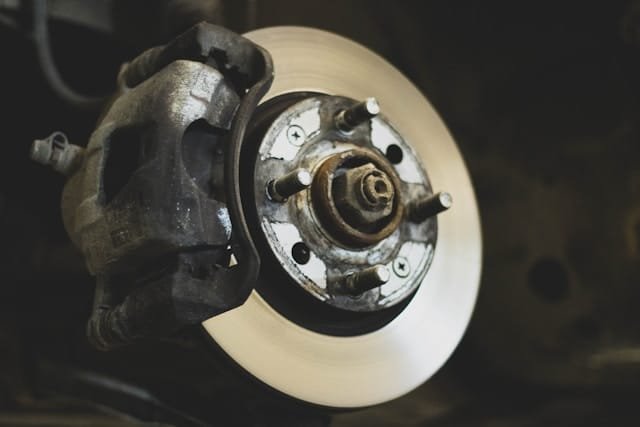September 11, 2024
7 Reasons Your Brakes Are Squeaking
Hearing that squeak or grind every time you brake while driving can be frustrating and worrying. If you’ve asked yourself, ‘Why are my brakes squeaking?’ Many drivers experience this issue. These sounds aren’t just an inconvenience—they’re often an early indicator that something in your brake system requires attention.
Understanding why your brakes make noise is important for your safety and your vehicle’s lifespan. Ignoring these sounds can lead to bigger problems, increased risks, and higher repair costs.
Let’s look at the seven most common causes of squeaky brakes and how prompt repairs can keep your vehicle safe and running smoothly.
1. Brake Pad Wear and Tear: A Common Reason for Squeaking

One of the primary culprits behind brake noise is the natural wear and tear of brake pads. As brake pads perform their essential function of slowing down your vehicle, they gradually wear down. Over time, as they become thinner, they can start producing a squealing sound when they come into contact with the brake rotors. This noise isn’t just an annoyance—it’s a clear signal that your car may need a brake pad replacement and a professional brake check.
Brake pads typically include a small metal component known as a wear indicator. When the pads get too thin, this indicator contacts the rotor, producing a squeal to alert you it’s time for a replacement. Ignoring this sound can lead to more serious issues, such as scoring on the rotors, which can result in costlier repairs down the line.
2. Morning Dew or Moisture: Why Your Brakes Might Squeak After Rain
Have you observed that your brakes squeak more frequently in the morning or after a rainy night?Moisture might be the cause. Overnight, condensation can accumulate on your brake rotors, forming a thin layer of rust. This rust can result in a temporary squeaking noise during your first few stops of the day.
Although this type of squeaking usually resolves itself after a few brake applications, it can still be unsettling. However, if the noise persists, it could indicate a more significant issue or more substantial rust buildup. In such cases, a thorough brake inspection can offer peace of mind and ensure your braking system is in top shape.
3. Glazed Brake Pads or Rotors: How Overheating Causes Squeaking
Glazing happens when brake pads or rotors overheat, typically resulting from aggressive braking or extended use. Overheating makes the pads harden and develop a smooth, glass-like surface, reducing friction and causing squeaking. This heat-induced change in the brake components directly affects their effectiveness.
4. Metallic Brake Pads: Why These Can Cause Your Brakes to Squeak
Metallic brake pads in your vehicle could be another reason for the squeaking sounds. Metallic brake pads contain small amounts of metal fibers, such as steel, iron, or copper. These pads are durable but can be noisier, especially if not bedded in properly or of lower quality. The metallic content in these pads can cause them to produce a squeaking or grinding noise when they come into contact with the rotors.
5. Foreign Debris: Why Dust and Dirt Cause Brake Noise
Debris like dust, dirt, or small stones trapped between the brake pad and rotor can cause brake noise. Though small, these particles can cause uneven wear, leading to more noise and reduced braking performance. This is common if you drive on gravel roads or through construction areas where debris can easily enter the brakes.
6. Lack of Proper Lubrication: Preventing Squeaky Brakes with Maintenance
Proper lubrication is essential for the smooth operation of various brake components, such as caliper slides and backing plates. Without adequate lubrication, these parts can’t move freely, leading to increased friction and, as a result, squeaky noises. Unlike glazing caused by overheating, lubrication issues usually result from wear and tear or poor maintenance. Proper lubrication of brake components can prevent squeaks and extend the life of your brake system.
7. Your Personal Braking Style: How Your Driving Habits Affect Brake Noise

Your personal braking habits can significantly influence how quickly your brakes wear out and how often they squeak. For example, if you frequently brake hard or make sudden stops, you may generate excessive heat that leads to glazing. Lightly pressing the brakes for a long time may not create enough heat to clear moisture or debris, causing squeaking. Adjusting your braking style to be smoother and more consistent can help prolong the life of your brake components and reduce noise.
How to Get Rid of Squeaky Brakes Without Taking Them Apart
If your brakes are noisy but you’re not ready to take them apart, try these simple steps to reduce or stop the squeaking:
Brake Hard a Few Times: Light braking may not generate enough heat to remove rust or debris causing the noise. Find a safe, open area and perform a few hard stops from moderate speeds. This can help clear away rust or dust from the rotors and pads, potentially removing the squeak.
Clean the Brakes: Dirt and grime buildup can contribute to brake noise. Without disassembling anything, you can spray the brake components with a specialized brake cleaner. This can help clear dust and debris stuck in the brake system.
Check the Brake Pad Wear Indicators: Many brake pads squeak when worn out. If the noise persists, they might need replacing.
Drive Regularly: If your vehicle sits unused, moisture can build up on the rotors, causing rust and squeaking. Regular driving can help prevent this from happening.
While these methods can sometimes reduce or eliminate brake noise, they are not substitutes for proper brake maintenance. If the squeaking continues, it’s important to have a professional check your brakes for any issues.
Steps to Silence the Squeak, Squeal, and Grind
Replace Worn Brake Pads
Addressing worn brake pads promptly is the most effective way to eliminate squeaking, squealing, and grinding noises. When brake pads wear down, they lose their ability to create the necessary friction, which can lead to these noises and reduced braking power. Replacing your brake pads not only stops the noise but also ensures your brakes perform effectively and safely.
Regular Brake Maintenance
Regular brake maintenance is essential for keeping your brakes in optimal condition. Regular cleanings and inspections keep your brakes free of debris and ensure everything works properly. Routine maintenance prevents noise and wear, extends your brake system’s life, and helps avoid costly repairs.
Proper Lubrication
Lubricating your brake system’s parts prevents squeaking and grinding and ensures smooth operation. Proper lubrication reduces friction between the components, minimizing noise and wear. It also helps to maintain the overall efficiency of your brakes, making them more reliable when you need them most.
Expert Brake Repair Services in Nampa
If your brakes are squeaking, squealing, or grinding and you’re unsure what to do, or if the noise continues, consult a professional. At Nampa Total Car Care, we specialize in thorough brake repair services that find and fix the root cause of your brake problems. Whether it’s a simple pad replacement or a more complex repair, our expert mechanics will ensure your brakes work at their best.
Don’t let brake noises cause unnecessary stress. Addressing the issue early can save you time, money, and, most importantly, ensure your safety on the road.
Schedule Your Brake Repair Today
Schedule your brake repair today with Nampa Total Car Care and drive with confidence, knowing your vehicle is in good hands. Our team ensures your brakes are in great shape, so you can drive safely.